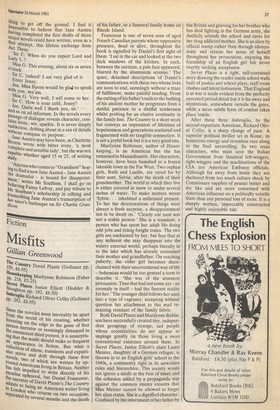Viction
14 • isfits
Gillian Greenwood
The Country David Plante (Gollancz PP. 159, £6.95) Housekeeping Marilynne Robinson (Faber Pp. 218, £5.25) Secret Places Janice Elliott (Hodder & Stoughton pp. 192, £6.50) lienbroglio Richard Oliver Collin (Gollancz PP. 292, £6.95) Since the novelist must inevitably be apart from the world of his creating, whether hovering on the edge in the guise of first Person narrator or seemingly distanced in the omniscient third person, it is unsurprising that the misfit should make so frequent an appearance in fiction. But what a collection of aliens, transients and expatriates strive and drift through these four novels, two of which are written by uprooted Americans living in Britain. Neither has felt impelled to write directly of his peculiar upheaval, but Daniel Francoeur, the narrator of David Plante's The Country admits to being an American writer living in London who returns on two occasions, separated by several months and the death of his father, to a funereal family home on Rhode Island.
Francoeur is one of seven sons of aged French Canadian parents whose oppressive presence, dead or alive, throughout the book is signalled by Daniel's first sight of them: 'I sat in the car and looked at the two dark windows of the kitchen. In each, between the curtains, a pale face appeared, blurred by the aluminium screens.' The spare, detached descriptions of Daniel's communications with these two whose lives are soon to end, seemingly without a trace of fulfilment, make painful reading. From the cutting of his father's nails to the bathing of his ancient mother he progresses from a dutiful patience to a dutiful tenderness whilst probing for an elusive continuity in the family line. The Country is a short work but conveys an impression of lifetimes of hopelessness and generations scattered and fragmented with no tangible connection. It is not a joyful book but it is a very good one.
Marilynne Robinson, author of Housekeeping, is an American but she has remained in Massachusetts. Her characters, however, have been banished to a frozen lakeside town in the Far West. Two orphan girls, Ruth and Lucille, are cared for by their aunt, Sylvie, after the death of their grandmother. The world in which they live is either covered in snow or under several inches of water. To make matters worse `Sylvie. . . inhabited a millennial present. To her the deteriorations of things were always a fresh surprise, a disappointment not to be dwelt on.' Clearly our aunt was not a stable person.' She is a transient, a person who has spent her adult life doing odd jobs and riding freight trains. The two girls are enchanted by her, but fear that at any mOment she may disappear into the watery external world, perhaps literally in to the lake which has already consumed their mother and grandfather. On reaching puberty, the older girl becomes disenchanted with their uncoventional way of life — bohemian would be too genteel a term to describe it. 'She was of the common persuasion. Time that had not come yet — an anomaly in itself — had the fiercest reality for her.' The younger child follows her aunt into a type Of vagrancy, accepting without question her attachment to this mad remaining remnant of the family fabric. Both David Plante and Marilynne Robinson have successfully created tiny, independent groupings of strange, sad people whose eccentricities do not appear to impinge greatly on those living a more conventional existence around them. In Secret Places, Janice Elliott's alien Laura Meister, daughter of a German refugee, is thrown in to an English girls' school in the 1940s, a community rigid in its unwritten rules and hierarchies. This society would not ignore a misfit at the best of times and the cohesion added by a propaganda war against the common enemy ensures that Miss Meister cannot be allowed to forget her alien status. She is a dignified character. Confused by the internment of her father by the British and grieving for her brother who has died fighting in the German army, she dutifully attends the school and cares for her drug addicted mother. She is an alien by official stamp rather than through idiosyncrasy and retains her sense of herself throughout her persecution, enjoying the friendship of an English girl but never overtly seeking acceptance.
Secret Places is a tight, self-contained story drawing the reader inside school walls built of pashes and school plays, staff room clashes and latent lesbianism. That England is at war is made evident from the perfectly executed period detail but it is far away and mysterious, somewhere outside the gates, while, a more subtle form of combat takes place inside.
After these three Imbroglio, by the second expatriate American, Richard Oliv er Collin, is a sharp change of pace. A superior political thriller set in Rome, its humorous energy and invention race along to the final unravelling. Its two main characters, who must save the Italian Government from fanatical left-wingers, right-wingers and the machinations of the CIA are American Embassy officials. Although far away from home they are sheltered from too much culture shock by Commissary supplies of peanut butter and the like and are more concerned with American influence on a politically volatile State than any personal loss of roots. It is a sharply written, impeccably constructed and highly enjoyable tale.










































 Previous page
Previous page